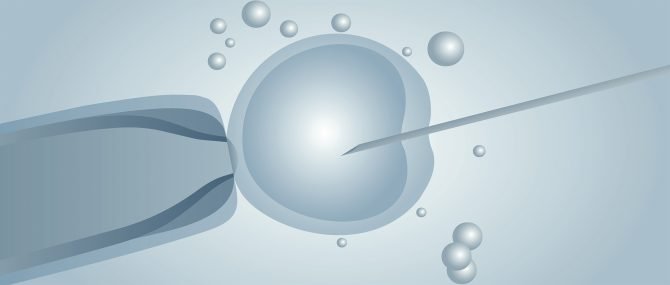In vitro fertilization or IVF is one of the most common fertility treatments nowadays. It can be carried out through the conventional process or through ICSI (intracytoplasmic sperm injection).
The way in which the egg and the sperm fuse together is what makes these processes different.
With conventional IF, it is the sperm itself which crosses the egg's plasma membrane and fuses with the egg; on the other hand, ICSI requires the involvement of an embryologist, who inserts the sperms directly inside the egg, thereby enabling the union between them.
ICSI is a high- complexity assisted reproductive technology, as it is comprised of multiple steps:
- Egg collection after ovulation induction and follicular puncture
- Sperm collection by masturbation, epididymal sperm aspiration, or testicular biopsy
- Egg-sperm binding, that is, fertilization itself.
- Embryo culture
- Transfer of the highest-quality embryo(s) to the maternal uterus
- Freezing (vitrification) of the viable unused embryos
Ideally, the eggs and the sperms used are expected to be provided by the intended parents; this is not always possible, though. Whenever the amount and/or the quality of the gametes is not enough as to achieve a pregnancy, gamete donation will be the the only remaining option.
In such case, the treatment is known as donor-egg IVF, which is to say, IVF in combination with egg donation.
Egg harvesting
The Czech Law that regulates medically assisted reproduction (Legislative Act No. 227/2006) establishes that oocyte donation must be an anonymous procedure, so donors are recruited by the fertility clinic's staff.
For the donor eggs to be picked, the donor has to undergo ovulation induction in order for more than a single ovarian follicle to mature, and therefore obtain a greater number of eggs.
Preparing the recipient's endometrium
Depending on the type of donation one is about to undergo, donor eggs can be fertilized right after being harvested or be vitrified in order for them to be used later:
- Fresh donor cycle: The eggs are directly fertilized with the prospective father's sperm or donor sperm. To that end, synchronization between the donor's and the recipient's cycle is required (by recipient we mean the intended mother).
- Frozen donor cycle: After harvesting the eggs produced by the donor, they are cryopreserved via the egg vitrification technique up until the moment when the recipient's uterus is prepared for embryo transfer and implantation.
Either way, before fertilizing the eggs and transferring the resulting embryos, the recipient's uterine lining should be prepared. This way we boost the chances of embryo implantation.
Even though recipients have to undergo neither ovarian stimulation nor follicular puncture, they have to start taking hormone medications (estrogens and progesterone) a few days before the transfer and until the date when it is considered appropriate by the doctor.
Such medications can be administered either via vaginal, oral, or patch route. They are used to make the uterus acquire a triple line pattern and the adequate thickness so that the chances of embryo implantation and therefore pregnancy are higher.
We make a great effort to provide you with the highest quality information.
🙏 Please share this article if you liked it. 💜💜 You help us continue!




Ok, it works more or less like in all European countries. Not sure which country will I finally choose, but surely I need donor eggs to get pregnant as mine is a case of POF 🙁